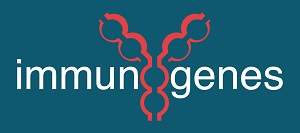Custom Antibody Services
ImmunoGenes is a biotech company specialised in the generation of transgenic animals to produce polyclonal and monoclonal antibodies (mAb).
ImmunoGenes’ IMG-AbSTM is a patented technology. Key features include:
- Generates antibodies against weakly immunogenic antigens
- Produces highly diverse antibodies
- Generates a higher number of antigen-specific B-cells
- Breaks immune tolerance to highly conserved antigens
- Significantly improves hybridoma production
- Higher levels of circulating antibodies
- FcRn transgenesis enjoys several practical benefits, including a route to the generation of antibodies against antigens of low immunogenicity that are difficult to address using currently available methods
- Neonatal Fc receptor (FcRn) overexpression more efficient antigen presentation and increased antibody diversity
- FcRn overexpression results in increased antigen-specific immunoglobulin M (IgM), immunoglobulin G (IgG) and total IgG levels and the number of antigen-specific B-cells.
Monoclonal antibody development service
The following phases are the basic steps of the process ImmunoGenes follows to develop custom antibodies. Each project is treated as unique and the company works with customers to create a protocol that works best for them to provide a tailor-made antibody.
Preimmunisation phase – on request (four to six weeks)
- Antigen design
- Peptide synthesis
- Peptide conjugation for immunisation purposes
Phase I: immunisation and screening (around ten weeks)
- Multiple (three to five) immunisation of eight FcRn overexpressing transgenic BALB/C mice
- Collection of test bleeds and determination of antibody titre by enzyme-linked immunosorbent assay (ELISA) using antigen
- Test bleed data will be evaluated jointly to determine the immune response within antisera. Serum samples can be shipped on request.
- Identify one to two mice for fusion purposes
- Boost selected mouse four days prior to fusion
Phase II: fusion (two to three weeks)
- Fusion (approximately nine weeks after initial immunisation two selected mice will be given a final boost for cell fusion)
- Parental clones are screened by ELISA (up to 1,000 hybridoma clones) to select antigen-specific IgG producer clones
- Supernatants are saved for further testing
- ELISA data will be provided and customer selects up to 12 supernatants (0.5-1 ml/parental clone) for shipment if requested
- After primary screening up to five positive parentals specific to the immunogen will progress to subcloning
Phase III: selection, subcloning and expansion of hybridomas (two to three weeks)
- Subcloning of selected microcultures
- All subclones generated in this phase will also be evaluated by direct ELISA against the antigen
- Only positive reacting subclones specific to the immunogen with sufficiently high titres will be carried forward to the customer for additional examinations
- Includes cryopreservation of parental clones (two vials per clone) and subclones (up to five vials per clone)
Phase IV: antibody production (on a 1l basis) and purification (up to 100ml of concentrated supernatant) (two to three weeks)
- Clones isolated in Phase III will be selected for antibody production
- ELISA–based mycoplasma testing of selected cell lines (per clone) will be performed prior to the production of antibodies
- Antibody produced (max 2mg) will be purified by protein A/G chromatography, followed by sodium dodecyl sulphate-polyacrylamide gel electrophoresis (SDS-PAGE) analysis of the protein using COOMASSIE stain – charged separately
- Antibody concentration will be determined for the purified monoclonal antibody using conventional methods and will be reported in tabular form
Polyclonal antibody development service
The following phases are the basic steps of the process ImmunoGenes follows to develop custom antibodies. Each project is treated as unique and the company works with its customers to create a protocol that works best to provide a tailor-made antibody.
Preimmunisation phase – on request (four to six weeks)
- Antigen design
- Peptide synthesis
- Peptide conjugation for immunisation purposes
Development phase: immunisation, screening and production (eight to ten weeks)
- Multiple immunisation (three to five) of three FcRn overexpressing transgenic rabbits
- Collection of animal pre-immune serum
- Collection of test serum bleeds
- ELISA-based antibody titre determination
- Terminal bleed collection
- Cryopreservation and storage of terminal bleed (n=1) until purification
Purification phase (around one week)
- Purification of 50ml of immune sera (2-7mg purified polyclonal antibody expected)
- Purification using protein G or peptide affinity purification, including column preparation

